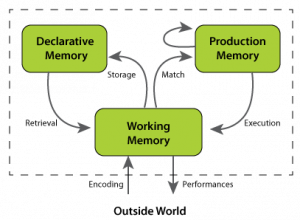Reference




OpenAI's Answer
ACT-R (Adaptive Control of Thought—Rational) is a cognitive architecture that has been applied in various educational technology contexts. Here are some of its main applications:
-
Cognitive Tutors: ACT-R is used to develop intelligent tutoring systems. These systems provide personalized instruction and feedback to students in subjects such as mathematics and programming. By simulating human cognition, ACT-R-based tutors can adapt to individual student needs, improving learning outcomes (source).
-
Modeling Cognition: ACT-R helps in modeling and predicting human cognition and interactions with the environment. This application aids in understanding how students learn and allows for the design of more effective educational tools (source).
-
Memory and Skill Acquisition: The architecture can explain various memory effects and account for the acquisition of higher-order skills like language learning and problem-solving (source).
These applications make ACT-R a valuable tool in advancing educational technology by providing insights into cognitive processes and facilitating personalized learning experiences.
Follow Up
Related
What is ACT-R/Phi, and how does it differ from ACT-R?
How does the law affect members of the Armed Forces, CSIS, or RCMP?
Name some medications that act as TrkB agonists and antagonists.
How does Republic Act No. 9208 protect trafficking victims?
What are some applications of the ACT-R cognitive architecture?